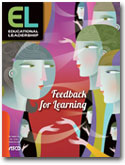An English teacher used to routinely write the letters "KGO" in the margins of student essays that he regarded as trite. KGO meant "Keen Grasp of the Obvious." Did the teacher have a keen grasp of the power of feedback? Unfortunately, no. Although his signature comment was memorable, he flouted the cardinal rule of giving good feedback. He didn't take into consideration how his students would take the feedback.
"No matter what he intended, this teacher's 'KGO' communicated 'See how clever I am?' rather than 'here's what you can do to make your essay better,'" Susan Brookhart writes in How to Give Effective Feedback to Your Students (ASCD, 2008). How much better to write, "Can you add any new information here?"
In this issue of Educational Leadership, we learn a lot about what feedback is and is not. It is not praise ("Good job!"); advice ("Try doing x"); judgment (the infamous "AWK" for "Awkward"); or even inference ("You must have been tired when you did this"). And it is not a grade or a number on a rating scale. The best feedback, our authors tell us, describes what the student has done and helps the student decide what to do next. Good feedback not only motivates, but also transfers a sense of agency to the learner.
Some great examples come from Jenny Edwards's book, Inviting Students to Learn (ASCD 2010), in which she offers 100 tips for talking effectively with your students.
"You must have worked very hard" becomes "You cited 18 authors in your report. What strategies did you use to find so many authors?"
"Good work!" becomes a statement that encourages growth: "Do you remember when you couldn't do this exercise? What did you do to figure it out?"
What might be voiced as criticism becomes a series of questions full of possibility for change, as in, "Where in the paragraph could you add more detail?" "What might be some other resources you could use to complete the project?" "If you had had more time, how might you have answered the second question?"
Assessment researcher John Hattie offers insightful distinctions about feedback in his article "Know Thy Impact" (p. 18). He tells us he has come to regret his enthusiastic endorsement of "dollops of feedback," knowing now that the effects of feedback, although positive overall, can be both bad and good. To make sure that feedback is effective, teachers must know where their students are going, how they are progressing toward the goal, and where they need to go next. Because all messages are filtered through the students' perceptions, what works as good feedback for one might not work for another. Hattie describes various levels of feedback appropriate for where the learner is—whether he or she is a novice, somewhat proficient, or very competent. He also notes that listening carefully to students' notions and providing "disconfirming feedback" may be essential at times.
There is no doubt that getting feedback right is a difficult job. In more than two of five scientific studies, Dylan Wiliam (p. 30) tells us, "You would have been better off shutting up than actually giving the feedback." We cannot understand feedback without thinking about how recipients might react, he writes. Feedback that falls short might make the recipient decide the goal is too hard or easy, reject or ignore the feedback, or even abandon the goal.
If effective feedback is so difficult to achieve, why spend so much time practicing it? This issue establishes many reasons, among them that giving in-effective feedback (overcorrecting or prescribing) wastes valuable instructional time (pp. 24 and 42). Another is that, as Susan Brookhart says, "Feedback says to a student, 'Someone cared enough about my work to think about it.'" Still another reason for sharpening feedback skills is that the overwhelming evidence shows that, when done right, feedback is likely the most effective tool educators have. Grant Wiggins (p. 10) urges, "Less teaching, more feedback." Or, to put it another way, "Giving good feedback is good teaching—and the key to achieving greater learning.
Editor's Note: Educational Leadership celebrates its 70th volume this September. As we begin the 2012–13 publishing year, we invite you to participate in the EL Readers Survey that will be electronically sent out to randomly selected ASCD members. If you don't receive a survey, send us an e-mail at edleadership@ascd.org that tells us what changes you would like to see. Feedback is very important to us!

